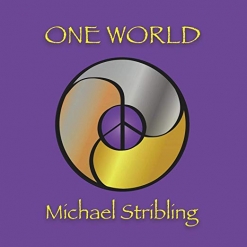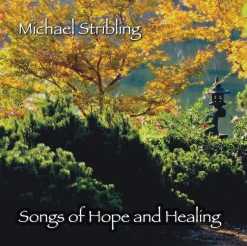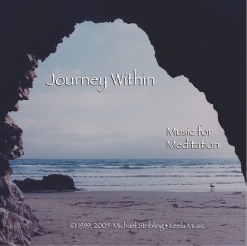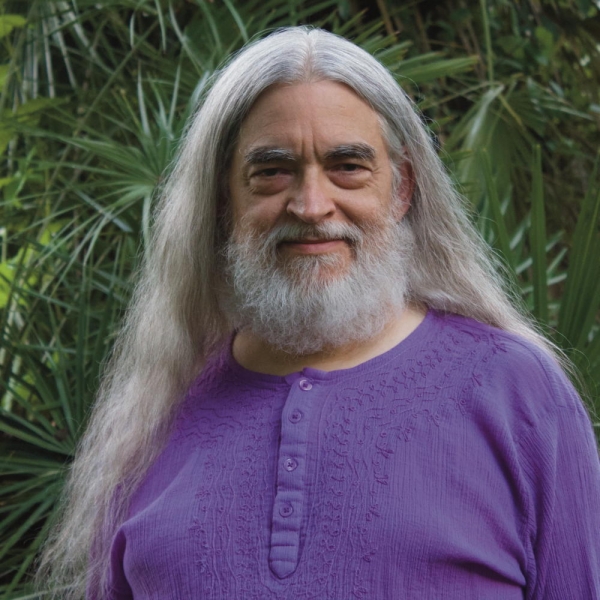I have been reviewing Michael Stribling's music since he released his third album,
Out of the Darkness, Into the Light in 2007. He has been one of my favorite electronic composer/musicians since that time, quite possibly because he started out as a pianist at the age of 7. He switched to drums in the mid-1960's and earned a Bachelors in Music before hitting the road playing drums for Johnny Mathis in 1974. Since then, he has worked in a dizzying number of different music genres and in a multitude of musical roles. He left music in 1981 to become a licensed marriage and family therapist and then returned to music in 2005. Since then he has released ten solo albums (the eleventh will be released 9/20/2019), all but one of which have been ranked in the Top 5 of the Zone Music Reporter international airplay charts, and two of which have won Best Electronic Album awards. We did an interview back in 2008, much of which goes into the earlier years of Michael's career(s). You can
find that interview here: This interview will bring us more up-to-date.
KP: Hi Michael! How are things in Central California today?
MS: As usual for this time of year, it's hot. It ranges from 95 to 105 degrees (that's 35 to 45 degrees Celsius) right now. I'm very grateful for air conditioning!
KP: I don't miss the hot weather in the Bay Area at all!
You are getting ready to release your eleventh album, One World, on September 20, 2019. Tell us about it.
MS: Let's see. Where can I start? This album has been percolating for some time, I guess. For example, "Asian Dawn Maneuvers" is really the original version of "Asian Dawn,” which was the stripped down version that was released on
Another Day in Paradise, in 2007. "Shaolin Garden" goes back to 2011, "Buddhist Nursery" was born in 2013, etc. So, some of these tunes have been around, in one form or another, for some time.

Click on album covers to go
to Kathy's reviews.
Basically, I took a look at the "inventory" of tunes that I had lying around and thought, "gee, this has the makings of a world album, I think." Like so many other things in life, it was just a happy coincidence (although I don't believe in coincidences) that all these compositions seem to assemble nicely into a complete project. Given the nature of things on our planet these days, it seemed like a good time to release something that focused on unity rather than division, and positivity instead of negativity.
KP: I agree completely and think your timing for One World is perfect.
I remember your saying in our last interview that up-tempo, energetic new age music doesn't get much radio airplay and you were looking at a more homogenized format for your albums. I have always enjoyed the surprise of the "bigger" music on your recordings and was happy to discover that One World is an exciting mix of quiet and contemplative music and much more rhythmic, driving tunes. Was that something you did intentionally or is that just the way the music flowed?
MS: It was a bit of both actually. Rather than set out to write a particular kind of tune, I tend to start with a sound, or a fragment of a motif, or some rhythm that gets me tapping my foot; then, rather than imposing my ideas on it, I just try to follow the leadings of the Muse, or the needs of the composition. It's a bit like tending a new sapling; I provide the water and nutrients, then it just grows on its own; as long as I don't get in the way, it will develop into its own creation. As for the more rowdy tunes, remember, I'm a drummer at heart, so there's got to be some energizing rhythm in there somewhere!
KP: That makes perfect sense!
The fifteen tracks on the album are a fascinating blending of music styles and traditions from around the world. Did you do a lot of studying to find the unique qualities of those traditions and to figure out what makes them distinctive and identifiable?
MS: I don't recall studying anything in particular, but I'm sure I drew upon all the music I've been exposed to over the years. Some of the instruments, or musical motifs are nearly archetypes for me; stereotypical things that I've heard before. And frankly, it's an amalgam of different motifs, all mashed together in some ways. As an example, "African Marketplace" includes an Er Hu, which is a Chinese stringed instrument; it just seemed to work, and it reflects the idea of unity within diversity.
KP: Interesting! There are a lot of different percussion instruments featured on One World. Did you play those actual instruments or are they digital?
MS: Again, it's a bit of both. Some of the tracks are loops, some I played, via MIDI, into some lovely samples.
KP: Is all of the instrumentation digital?
MS: As far as I can recall, I didn't use a microphone on this album. It was all created "under the hood" as they say, all in the digital domain.
KP: Your quote in the liner notes of the CD really resonated with me: "in times of challenge and struggle, there is also opportunity for positive change, for healing and unity. May we focus on what we want for our world and not what we fear may happen." It's so easy to get caught up in the constant barrage of ugly news and the "us and them" attitude that seems so prevalent, so thank you for those words. It's not easy to put into practice, but it's a great place to start!
MS: It's all about the good old Law of Attraction, I suppose. We create our life experiences by what we think, feel, and do. If we put out positive energy, we can expect positive things in our lives; if we express negativity, we can expect more negative things to appear in our lives. If this is the dawning of the Age of Aquarius, we'd better start thinking and acting that way. Think about what you want, not what you don't want. Sometimes it's a real challenge, but practice makes perfect.
KP: Very wise words!
Ultimately, what is the one thing you would like listeners to gain from your music?
MS: I'll fall back on the Leela Music mission statement: The mission of Leela Music is to help others in their journey toward wholeness through the gift of music, by creating works that inspire and uplift the human spirit. If the music is inspiring and uplifting, then I've done my job.
KP: I'm sure some readers will go and read our
earlier interview, but let's cover just a few basics. Why did you call your record label "Leela Music"?
MS: Leela is a Sanskrit word (as I understand it) that means "divine play.” There are two meanings here: one is the kind of playing, like kids on the playground, that the gods enjoy; the other refers to that divine stage play, as described by Shakespeare: "…a poor player that struts and frets his hour upon the stage…" I prefer the first meaning; I just love to play around with sound and music.
KP: You were a professional musician early in your adult years and then started working in the mental health field. Tell us a bit about that.
MS: The short version is that my life crashed around me in 1976, and I went into therapy for the first time. As a result of that experience, I felt moved to pass on to others the healing and growth that I experienced. I've been a licensed marriage and family therapist for over 27 years now, and I still enjoy helping others find their own path into healing and wholeness.
KP: Do you use your music (or music at all) in your therapy practice or do you keep the two separate?
MS: To this point, I don't commingle the two. Given my current mental health role, music therapy is not really an option.
KP: With all of the changes in the music industry, how do you see electronic music evolving?
MS: First of all, I certainly don't claim to be any kind of expert when it comes to electronic music. There's a very wide range of music that can be called "electronic"—from electronic dance music, to rap and hip hop, which use lots of samples and loops, to, well, the stuff I compose. I like to think that the music I produce is quite musical, even though it is almost entirely created in the digital / electronic domain. I imagine some purists lament this; "where is the live performance?" But I know that purists also complained about the advent of electronic / electric guitars back in the day, and look how that has evolved.
KP: Are you still teaching at the university level?
MS: No. I left the university four years ago and went to work in a jail that houses around 3,000 inmates. These days, I work with inmates who have problems with the abuse of alcohol and other drugs. It has been quite a blessing. Among other things, my compassion for others has increased, along with my gratitude for the many blessings I enjoy on a daily basis.
KP: Since our last interview, you also got married. Tell us a little bit about your wife, Alana.
MS: Can you see me blushing and giggling? My sweetheart, Alana, is the love of my life. She is very creative (you know, graphic design, crafts, etc.) and has a passion for working with special needs individuals, especially children. She is pursuing certification as an interpreter of American Sign Language. And she's picked up a camera lately and is exploring the world of photography (note the artist photo on the One World album cover). She loves to travel, and we're getting ready to take another trip to Europe in October. I don't think I would have traveled much if it weren't for her enthusiasm. Pardon me for a moment while I smile …
KP: That's great! Do you have plans yet for your next musical project?
MS: There's always something in the oven, so to speak. But for now, we have a new CD to promote, and that takes a good deal of time and energy. On the other hand, I know I need to get back to playing around with sound in the very near future. It's my bliss.
KP: Is there anything else you'd like to "talk" about?

no review available
MS: The first thing that comes to mind is the work we've been doing with Dr. Joe Dispenza, of
What the Bleep Do We Know… fame, released in 2004. He conducts advanced week-long meditation workshops, all around the world, that incorporate the latest in neuroscience research, among other things. Those words really don't begin to describe the wonderful work he's doing. Interested parties can just go to YouTube and type in his name. There are lots and lots of videos there, and we are re-reading his four books on a regular basis. That work has really changed our lives, and I can't promote him enough. I encourage everyone to check him out.

no review available
One more thing. Thank you so much, Kathy, for the opportunity to chat with you again. Let's not wait another 10 years for the next one!
KP: You're very welcome, Michael! I was really surprised to see that it had been so long between interviews! Very best wishes on the release of One World! I think it's your best album so far.
Many thanks to Michael Stribling for taking the time to chat! For more information about Michael and his music, be sure to visit
his website and his
Artist Page here on MainlyPiano.com.
Kathy Parsons
August 2019



